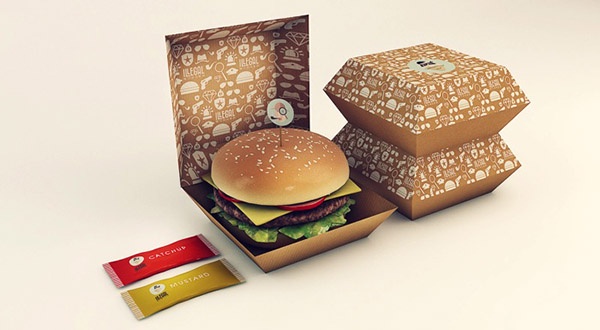In recent years, the food industry has been under pressure to adopt more sustainable practices, including eco-friendly packaging. The fast-food industry, in particular, has come under scrutiny for its excessive use of packaging materials that are harmful to the environment. As consumers become increasingly aware of the negative impact of waste on the planet, they are demanding more sustainable packaging options. In response, many fast-food chains have started to switch to eco-friendly burger packaging. This article will explore the reasons why eco-friendly burger packaging is the future of the food industry.
The Problem with Traditional Burger Packaging
Traditional burger packaging is made from materials that are not biodegradable and are harmful to the environment. Polystyrene, commonly known as Styrofoam, is one of the most commonly used materials for burger packaging. It is cheap and lightweight, but it takes hundreds of years to break down, and it can release toxic chemicals into the environment. Other materials used in burger packaging, such as plastic and aluminum, are also harmful to the environment. They are not biodegradable and can take hundreds of years to decompose.
The Benefits of Eco-Friendly Burger Packaging
Eco-friendly burger packaging is made from materials that are biodegradable, compostable, or recyclable. These materials are usually derived from renewable resources, such as plants, and they break down much faster than traditional packaging materials. The benefits of eco-friendly burger packaging include:
1. Reduced Environmental Impact
Eco-friendly burger packaging has a much lower environmental impact than traditional packaging. It is made from renewable resources and is biodegradable or compostable, which means it does not contribute to the buildup of waste in landfills. In addition, some types of eco-friendly packaging can be recycled, which further reduces their impact on the environment.
2. Improved Brand Image
Adopting eco-friendly burger packaging can improve a fast-food chain's brand image. Consumers are becoming increasingly aware of the negative impact of waste on the environment, and they are more likely to support companies that demonstrate a commitment to sustainability. By using eco-friendly packaging, fast-food chains can show that they are taking steps to reduce their environmental impact and improve their sustainability.
3. Cost Savings
While eco-friendly burger packaging may be more expensive than traditional packaging in the short term, it can lead to cost savings in the long run. Many types of eco-friendly packaging are made from renewable resources, which means they are more sustainable and can be produced more efficiently. In addition, some types of eco-friendly packaging can be recycled, which reduces the need for new materials.
Types of Eco-Friendly Burger Packaging
There are several types of eco-friendly burger packaging that fast-food chains can use. Some of the most common types include:
1. Paper-Based Packaging
Paper-based packaging is a popular choice for eco-friendly burger packaging. It is made from renewable resources, such as trees, and it is biodegradable and recyclable. Paper-based packaging is also customizable, which means it can be branded with a fast-food chain's logo and colors.
2. Biodegradable Plastics
Biodegradable plastics are made from materials that break down quickly in the environment. They are often made from corn starch or other plant-based materials. Biodegradable plastics are biodegradable and compostable, which means they do not contribute to the buildup of waste in landfills.
3. Compostable Packaging
Compostable packaging is made from materials that break down quickly in a composting environment. It is often made from plant-based materials, such as corn starch or sugarcane. Compostable packaging is biodegradable and compostable, which means it can be turned into compost and used to nourish soil.
4. Mushroom-Based Packaging
Mushroom-based packaging is a newer type of eco-friendly packaging that is gaining popularity. It is made from mycelium, the root-like structure of mushrooms. Mushroom-based packaging is biodegradable and compostable, and it can break down in a matter of weeks. It is also customizable and can be molded into different shapes and sizes.
Fast-Food Chains That Are Adopting Eco-Friendly Burger Packaging
Many fast-food chains are starting to switch to eco-friendly burger packaging to reduce their environmental impact and improve their sustainability. Some of the chains that are adopting eco-friendly burger packaging include:
1. McDonald's
McDonald's has committed to sourcing 100% of its coffee, palm oil, and fish from sustainable sources by 2020, and to reduce greenhouse gas emissions by 36% by 2030. The chain has also started to use eco-friendly burger packaging in some of its restaurants.
2. Burger King
Burger King has committed to using eco-friendly packaging that is biodegradable, compostable, or made from renewable resources by 2025. The chain has already started to switch to paper-based packaging for its Whopper sandwiches.
3. Wendy's
Wendy's has committed to sourcing 100% of its lettuce, tomatoes, and cucumbers from indoor farms by 2025, and to reduce greenhouse gas emissions by 20% by 2030. The chain has also started to switch to eco-friendly burger packaging, such as paper-based wrappers for its sandwiches.
Conclusion
Eco-friendly burger packaging is the future of the food industry. Traditional burger packaging is harmful to the environment and contributes to the buildup of waste in landfills. Eco-friendly packaging, on the other hand, is made from renewable resources and is biodegradable, compostable, or recyclable. Fast-food chains that adopt eco-friendly packaging can reduce their environmental impact, improve their sustainability, and enhance their brand image. By switching to eco-friendly burger packaging, the food industry can take an important step towards a more sustainable future.


No comments yet